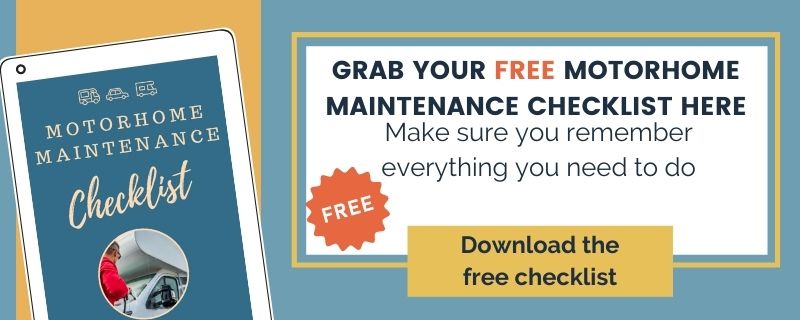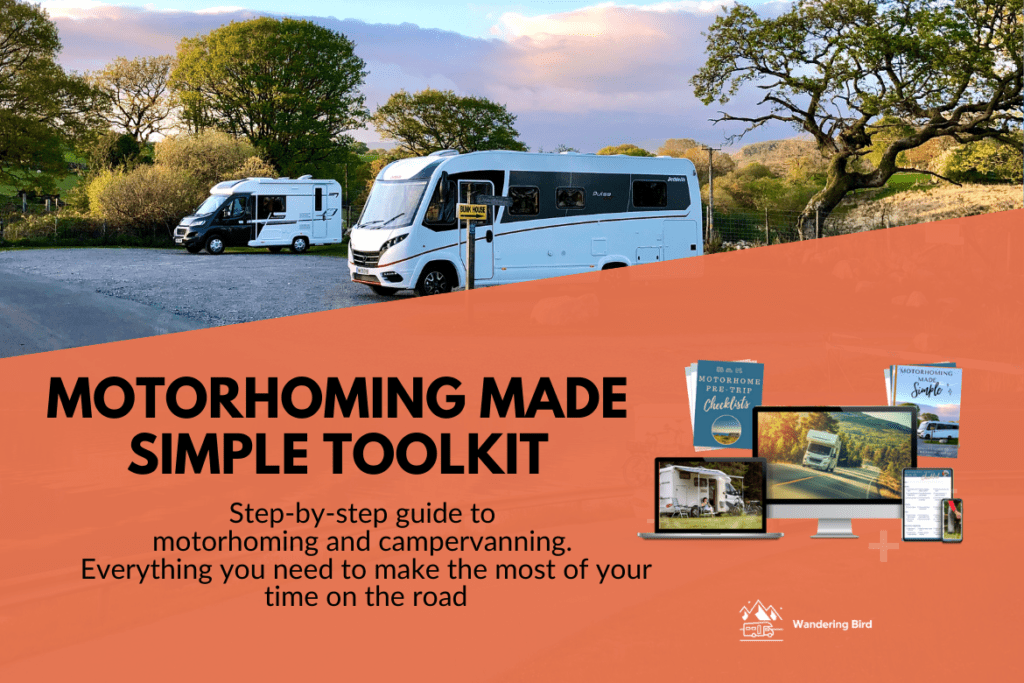Motorhome or campervan owner? Worried whether a motorhome habitation check is a legal requirement, if you need a certificate and how much it costs? Here’s everything you need to know!
Don’t forget to grab your FREE motorhome maintenance checklist below to help you stay organised.
*We work hard to make this the best motorhome travel blog and road trip website possible, full of helpful content for you. The website is supported by our readers, so if you buy through links on this site we may earn a commission- at no extra cost to you. All opinions remain our own.
If you find this post useful, you can also treat us to a coffee – we promise to enjoy it while creating more useful content like this- we might even indulge in a biscuit (or two!)
What is a Motorhome Habitation Check?
A habitation check is an in-depth inspection of the living area of your motorhome, campervan or caravan. It is a series of checks which tests all the systems in your van and makes sure they are working well and safe to be used.
It includes things like:
- checking the gas appliances, system, pipes and associated appliances
- checking the water systems and tanks
- damp check
- full check of the electrical system and motorhome leisure batteries (although not solar)
- safety gear checks
- bodywork of your motorhome
- many other things!
Where do you get a habitation check for vans done?
You can either do a habitation check yourself (if you know what you’re doing) or get an approved person to do it for you.
For a motorhome habitation check to be recognised (for example, if you’re selling your motorhome or to maintain the warranty), it needs to be carried out by qualified personnel, just like a house survey. More info on where to find an approved centre later in this post.
Does a habitation check replace an MOT?
NO! A habitation check is NOT the same as an MOT. It doesn’t check the engine or general roadworthiness of the vehicle, JUST the living (habitation) areas. You still need to get an MOT even if you have a hab check.
Is a habitation check a legal requirement?
No, a motorhome habitation check is not legally required unless requested by your motorhome insurance company OR you hire it out to other people using a company like GoBoony.
You do NOT need to have an annual habitation check before you can drive or use your vehicle (unlike an MOT, which you need before you can drive it.) It’s perfectly ok to drive and use a motorhome that hasn’t had a hab check for years, as long as you have in-date insurance, MOT and tax.
We always recommend getting a habitation check done when you buy a second-hand motorhome and, of course, if your motorhome insurance company requires one or you need one to maintain a warranty, then you will need to get one done. But, technically, you do not legally need to do a hab check at all, especially not an annual check.
HOWEVER…
Might I suggest that you do.
Why motorhome habitation checks are important
You’ve spent a lot of money on your motorhome and campervan. It’s a significant investment. Sure, it’s an asset which can (and probably will) depreciate, but it doesn’t have to depreciate a lot.
With proper care and maintenance, you can keep the resale value of your motorhome high and increase saleability of your motorhome (unless you’re like us and spend most of your time touring around Europe and adding on high mileage!)
Even more important, regular habitation checks keep you and your family safe and are great for peace of mind. If there is a potential or existing problem with your gas or electrical system, a habitation check can unearth it (pun intended!)
Watch the video about Motorhome Habitation Checks here:
Prefer video to reading? Click below to watch our video all about habitation checks for motor homes and campervans and how to prepare for one.
(Don’t worry if you can’t watch a video at the moment- keep scrolling for all the info you need)
We hope you found the video useful. If you did, we’d love it if you followed us on Youtube. New videos with tips for motorhoming and campervanning in the UK and Europe are released weekly.
How often should you have a motorhome or camper habitation check?
Some motorhome owners advise getting a habitation check done every year and there’s nothing wrong with this. Personally, I get the gas system checked by an approved engineer, but only get a full habitation check done every few years, unless I spot a potential problem area, like a damp spot or water ingress.
If you have an older motorhome or one with a wooden construction, then you might wish to get a check done more frequently (perhaps twice a year), just in case there is any damp discovered; rot can be lethal to a wooden frame, so the quicker you discover it, the quicker you can fix it.
How to book a motorhome habitation check
You can request a habitation check from an appropriate garage at any time. Most people choose to do them at the start of the year or after a period of disuse, like after winter storage.
If you’d like to do the same, book in as far in advance as possible- they can get booked up months in advance.
Again, you are free to use your vehicle without a habitation check as long as you are insured, so don’t worry if you can’t get it booked in before your first trip.
You can either take your vehicle to a service centre, or you can book a mobile engineer to visit you. Bear in mind, if you store your motorhome at a yard, you might not be able to use a mobile engineer as they will need access to 230v and water.
Where to find a motorhome habitation check near you
You can get a camper hab check done in many places. Many motorhome dealers offer the service (for a fee), as do some bigger garages. It works a bit like an MOT- you drop the van off with them and they’ll do a thorough inspection, highlighting any issues to you. This is usually done the same day as you drop it off- ours took around 4 hours.
There are places which are ‘Approved Workshops’, a group of independently assessed workshops, regulated by the NCC (National Caravan Council), The Caravan and Motorhome Club and The Camping and Caravanning Club.
There are currently over 500 fixed and mobile Approved Workshops across the UK. In order to be accepted on to the Scheme, workshops must pass an annual inspection by a team of independent assessors and must comply with the Scheme’s standards. You can find out more here
A mobile habitation check service can be a great idea, but remember they might need power to be able to do a proper job.
How much does a motorhome habitation check cost?
The price of a hab check for motorhomes can vary greatly. Our last one cost us around £290, which included a gas safety check. This is quite expensive, but it was on the south coast of England and was done by a dealer. Previous ones have been around £250.
A member of the approved workshop scheme might charge more but you know it’s going to be a thorough inspection of the living area of your campervan or motorhome.
What does a motorhome habitation check involve?
What to expect from a hab check:
- In order to do a thorough inspection of the habitation area of your motorhome, the engineer will need access to everything in the van, so have keys for all lockers and the garage etc.
- Clearing out the motorhome for damp checks – ask the company company what they require, some want the van as empty as possible and some don’t. For newer vans (that aren’t constructed of wood), areas at floor level will be the only required area to check with their meters. If you have an older van, clear out as much personal gear from the inside of the motorhome as possible. They need to get everywhere to check for damp or areas of ingress, especially in garages or lockers, and not having to move things around will make it easier to spot problem areas.
- They will usually drain your water system and water heater, so don’t bother filling it before the check.
- They will need gas in the bottles to do a gas check (some centres can provide their own bottles if you don’t have one- do check in advance).
- If they are coming to you at home or at a storage facility, they will need a mains electric connection going into the van so they can check the sockets and other electrical systems in order to do a full report. They’ll also need to see and check your leisure battery.
- Presence of smoke and Co2 alarms and in working order.
- Presence of a fire extinguisher and within date.
- Some companies will checks all the seals around the van.
At the end of the habitation check, you will receive a detailed report, which will include:
- damp report from the damp testing
- anything requiring immediate attention or a fire risk
- possibly a gas system check certificate, which should be kept with your paperwork. You might need to forward a copy to your motorhome insurer.
Motorhome habitation check list
Here’s a list of things which will be checked during your motorhome or campervan habitation check:
- Underbody- including underslung tanks and pipes
- Electrical checks- including plugs, road lights, leisure batteries, fridge, lights, air conditioning if you have it, wiring, RCD, boiler and 230v fitted appliances (NOT solar panels)
- Gas system- including regulator, hoses, check for gas leaks , tanks, flame failure, vents and all appliances which use gas
- Water system- including pump, switch, heating system, taps, valves, pipes, filters, tanks, seals and the toilet.
- Safety equipment- They will check these devices are in good working order, including smoke alarm and CO detector, fire extinguisher and fire blanket (if fitted)
- Bodywork- doors, windows, roof vents, seats in cab, floor, walls, damp test, blinds/ fly screen, ventilation
- External seals – some companies will check all the seals for any potential failings.
Can I do my own motorhome habitation check?
Absolutely. If you know enough about the systems on your motorhome, campervan or caravan, you can certainly do the majority of the habitation inspection yourself- we do. The only one I would be wary about is gas, because it can be so easy to miss potential problems which can have severe consequences.
If nothing else, you can do a regular visual inspection of the systems to see if you can spot anything which might need looking at. BUT I would advise to get it done professionally for peace of mind that you are adhering to any warranty and insurance requirements.
Motorhome habitation check list/ sheet
If you are confident enough to do your own habitation test, start working through the habitation check list- you can see an example here. If you see anything suspicious or worrisome, you can always take it to a service centre for them to deal with. You will need to purchase a damp meter so you can check the walls and surfaces- although please be aware that consumer units are rarely as accurate as professional ones.
Of course, if you are preserving a warranty or needing a motorhome habitation check for insurance issues, you’ll need to get a professional one done so you have the certificate, but otherwise there’s nothing to stop you doing it yourself- you’ll get to know your van so much better too.
Also, don’t forget you will still need to do motorhome servicing at an approved location so you can get a stamp in the service history book.
Want more tips for motorhoming?
Here are some more ideas you might find useful:
Want FREE checklists, eBooks and additional tips to help? Visit our resource page





